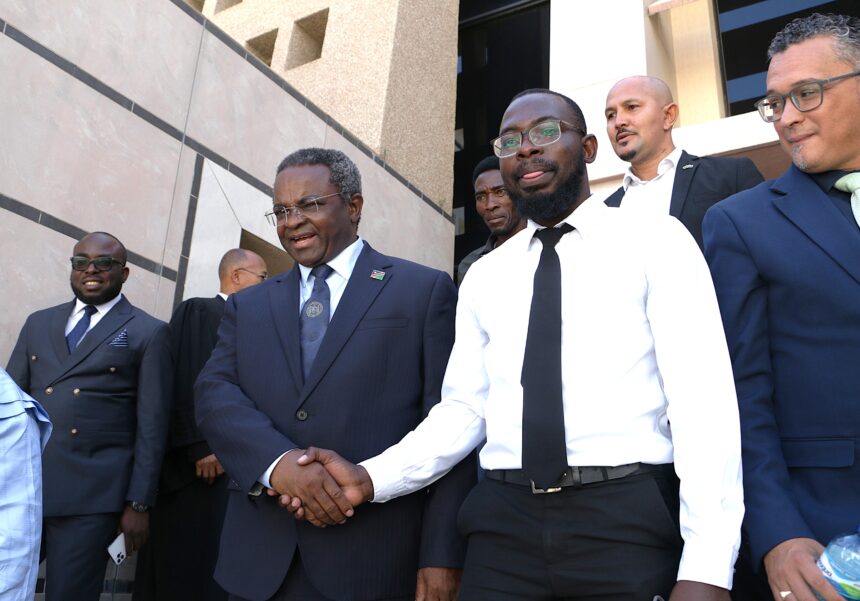Iuze Mukube
The Supreme Court has determined that the extension of the 2024 November elections was lawful and in the best interest of the public.
Chief Justice Shivute rendered this decision on Friday, saying that Proclamation 34 of 2024, which established the extension period, guaranteed that all eligible voters had the opportunity to exercise their democratic rights without undue disadvantage.
At the helm of a full bench, he dismissed the election challenge put forth by the Independent Patriots for Change (IPC) and the Landless People’s Movement (LPM).
The contention was on the legality of the extension granted by Proclamation 34, enacted by President Nangolo Mbumba, alongside the Electoral Commission of Namibia(ECN).
However, the court determined that there was no evident unfairness to any prospective voter resulting from the contested proclamation.
On the contrary, it provided an opportunity for every eligible voter who, by appearing at polling stations, demonstrated their intention to vote.
Furthermore, there was no evidence presented to suggest that any of the presidential candidates were unfavourably affected by the extension of the voting period.
The election challenge initially included concerns over alleged election irregularities.
However, IPC subsequently dropped this assertion, opting instead to focus solely on the constitutionality of the extension period.
Following the announcement of the ruling, Shivute stated that the extension was following constitutional provisions and was enacted for the broader public interest.
Additionally, the decision to limit voting to just 36 polling stations during the election extension was not deemed inherently discriminatory.
Shivute stated that the selection of these specific stations, whilst excluding others, was to achieve or related to, a legitimate and important public purpose.
Shivute added that the parties’ concern about an implied power to extend voting, which can potentially allow the President to manipulate the election for personal gain, was unfounded.
This is because the President can only extend the voting based on a recommendation from the ECN and does not have the authority to do so independently.
Furthermore, if there is evidence that the extension was misused for an improper purpose, such action could be legally challenged.
The case would then be decided on the specific facts presented.
Additionally, Shivute said that declaring an election invalid solely because it was not completed within the timeframe set by section 64 of the Electoral Act, without evidence that eligible voters were denied the right to vote, would be disproportionate and offer no legitimate public benefit.
Moreover, to refuse to acknowledge the power to extend voting to afford eligible voters the right to vote, especially in circumstances like those faced by the ECN on 27 November 2024, would not serve any legitimate public objective.
It was ruled that there were no compelling public policy considerations within the Electoral Act to justify nullifying an election without first allowing ECN and the President the opportunity to re-exercise authority under section 64(1)(b).
This is to safeguard and promote the right to vote when necessary.
Additionally, the ECN had the authority to recommend an election extension to the President, who, in turn, had the power to re-exercise this authority under section 64(1)(b) of the Electoral Act.
This ensured that the voters who would have otherwise been disenfranchised had the opportunity to vote on 29 and 30 November 2024.
The extension did not create new election dates or a new election.
It was a continuation and completion of the election originally established by Proclamation 28 of 2024 on 26 September 2024, he emphasised.
Shivute ruled that Proclamation 34 of 2024 was lawfully enacted and the voting that occurred on 29 and 30 November 2024 was valid and lawful.
Therefore, given that the applicants failed to make out a case for the invalidation of Proclamation 34, their challenge to the outcome of the 2024 Presidential elections failed.
He ordered that it was not a proper case to order legal costs against the unsuccessful parties, and that each party should pay its own costs.
Panduleni Itula, the leader of IPC, stated that the party will abide by and accept the ruling regarding its election challenge.
He said the decisions made by the apex court are binding for all citizens of Namibia.
“We stand by that decision. We now have to go and prepare, and really make sure that this government is accountable to the people of Namibia,” he said.



